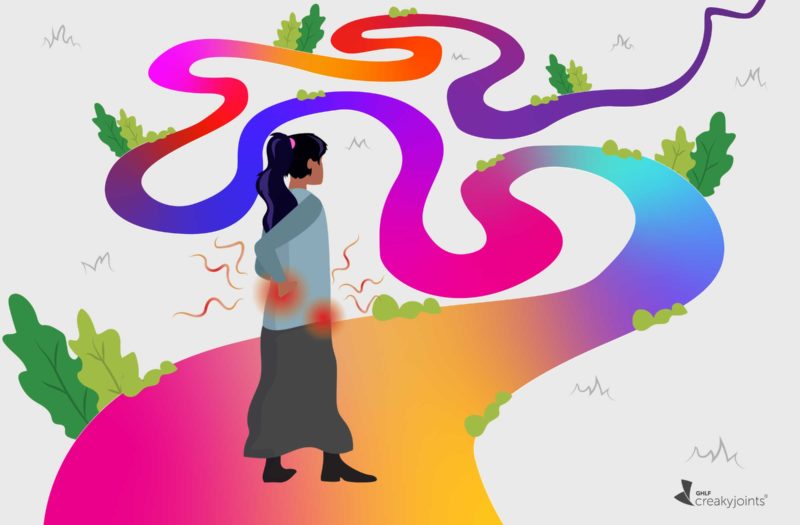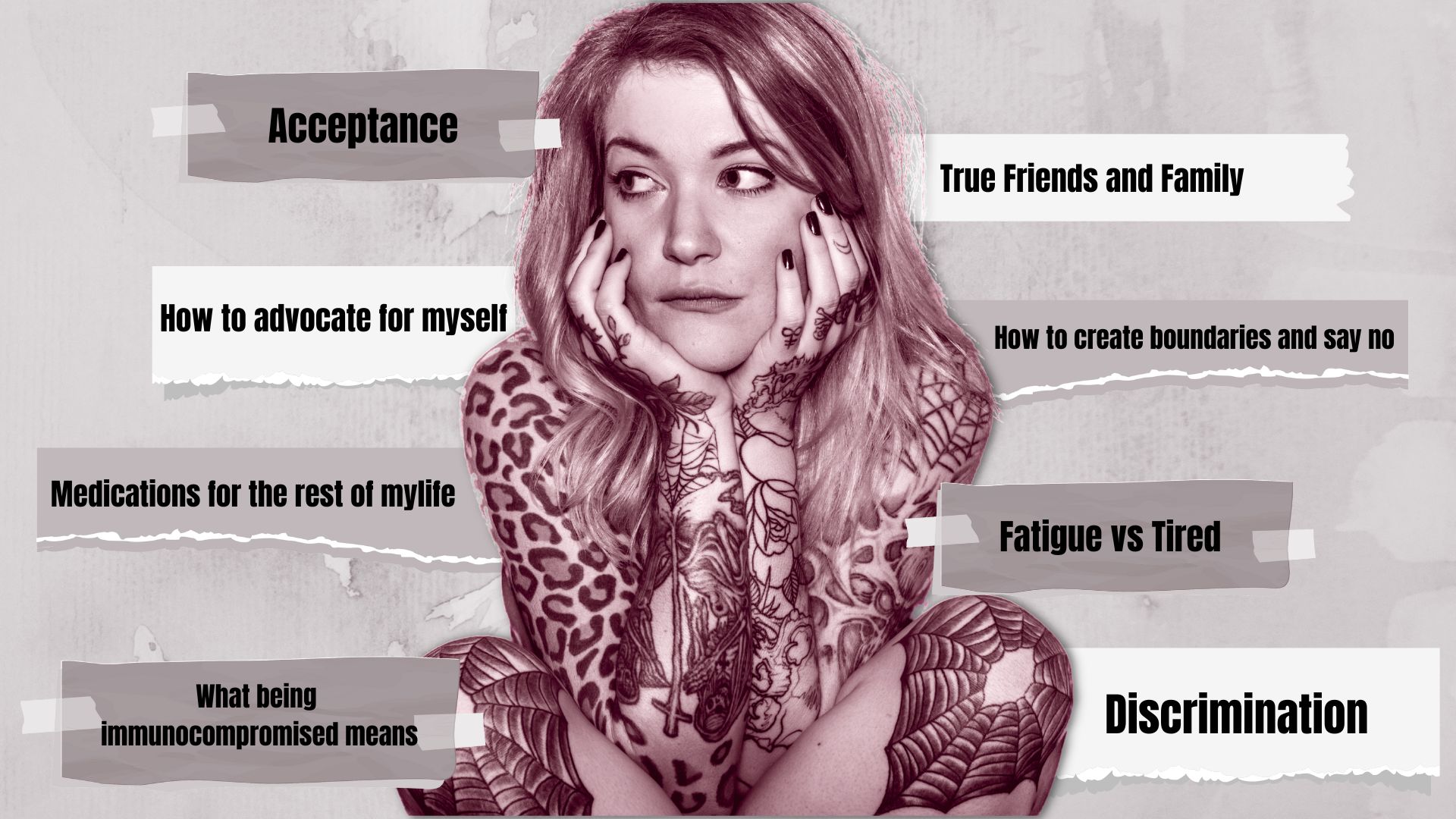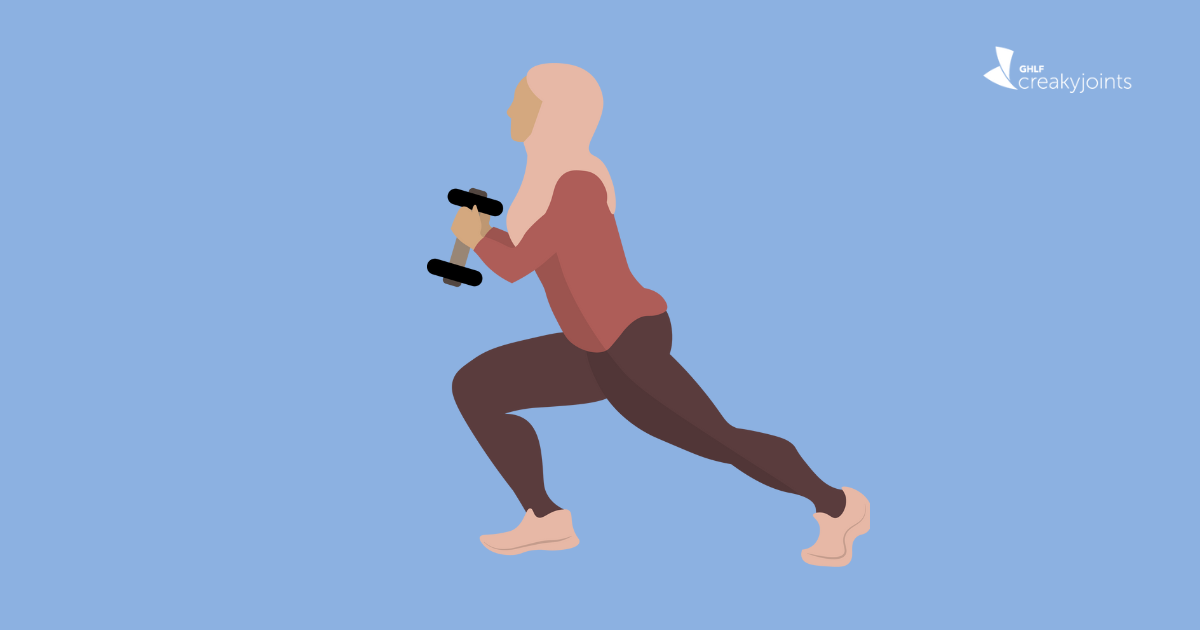Have you ever questioned whether your pain is real? Maybe you start to have a conversation with yourself that goes something like this:
- “Maybe this back pain is just a natural part of aging?”
- “Doesn’t everyone complain about being tired, maybe this fatigue is just part of being a human?”
- “Hmm. She had trouble opening that jar, too, maybe it isn’t from my arthritis?”
Recently I’ve been playing this game in my head. I started to convince myself I was overreacting. This is just life; there is nothing unique with my symptoms.
When you live with a chronic illness, you are all-too familiar with chronic pain. People living with a rheumatic disease have to deal with chronic pain, stress, exhaustion, disability, and emotional distress — and this all impacts our daily life. It impacts the small things in my life like cooking dinner or walking the dog, and also the big things like my personal relationships and broader social life.
Because chronic pain is such a big part of my life, it’s hard to separate what’s “normal” or not. When you live with chronic illness, your symptoms become the norm and when you get so used to being in pain, it’s easy to brush it aside. You settle for an unacceptable level of pain as your normal because that’s just life with a rheumatic disease — or so I thought.
Medical gaslighting makes it hard to believe in my pain
After years of medical professionals denying my pain, I suddenly found myself doing the same. I spent many years chasing a diagnosis, during which I had a doctor tell me it was all in my head. I continued to see specialists and advocate for myself, all to be told that my labs looked perfect, and nothing was wrong. But I was in tremendous pain, how could it all be in my head? What young adult wants to live in pain? It’s not exactly cool to be in and out of the hospital as a freshman in college. Why didn’t the doctors get this?
I did eventually get my diagnosis of Crohn’s disease and spondyloarthritis, but after years of medical gaslighting, or hearing “there’s nothing wrong with you; it’s in your head.” Medical gaslighting messed with my head. The feeling can be just as crippling as the pain itself, and it sticks with you like a trauma. It shows up when I see a new doctor and I feel like I have to prove myself; when someone makes a flippant comment about my conditions; and at times, even from myself when I begin to doubt my chronic pain.
When a pain-free day brings belief
That is, until I recently experienced a pain-free day, and I stopped gaslighting myself. The conversation in my head quickly turned to “my pain was real; my pain is real.”
I’ve been on the same medications for a few years, and in the past year I started to find my symptoms getting worse. In the past few months my pain was really getting in the way of my daily living — I was struggling with morning stiffness in my joints, pain in my lower back, and having little to no energy —and I had enough. It was time to say that I can’t tolerate living this way.
I was scared to tell my doctor how I was feeling, because it meant I had to admit it out loud to myself. I also wasn’t exactly sure if my pain warranted such a big discussion, or if it was just par for the course of living with arthritis. My rheumatologist and I decided to do a round of steroids to see if it would help relieve my discomfort while we figured out my treatment plan going forward.
Almost immediately after starting on the prednisone, I felt my pain dissipate and I started to cry. I realized how much pain I had been in, and how unacceptable it is to live like that; I felt validated. No, it was not ‘in my head.’ And even though it’s been years since I heard that, it lives with me every day.
Feeling imposter syndrome for pain
I was chatting with my friend and colleague at the Global Healthy Living Foundation/CreakyJoints, Sarah Shaw, about these pain-free days and the range of emotions that follow, and she agreed. She even had a name for it: ”imposter syndrome for pain.”
Imposter syndrome is defined as “the persistent inability to believe that one’s success is deserved or has been legitimately achieved as a result of one’s efforts or skills.” In the context of chronic pain, I would describe imposter syndrome as: the persistent inability to believe that one’s pain is real or significantly impacting one’s well-being as a result of medical gaslighting.
Until my pain-free day, I had been feeling this imposter syndrome, having conversations with myself that my pain isn’t real or not as bad as I’m making it out to be. And while it felt good to have this wake-up call, my pain-free day came with a lot of unexpected emotions.
Defining My Emotions
Here are the eight emotions that bubbled up for me — and that you may feel too.
You may feel validated
Feeling the pain go away made me realize just how severe and unacceptable it was to be living this way. I felt a sense of relief at the confirmation that I was in fact feeling all the pain that I had been feeling.
You may feel doubt
On the flip side, you may feel doubt. With a few pain-free days in a row, I can start to think maybe this is something that could just go away and I don’t need to adjust my treatment.
You may feel anger
Once I felt the absence of pain, I felt anger for the amount of pain I had been enduring and for so long.
You may feel grief
I felt grief and sadness for what my life was like before dealing with chronic pain. In getting a taste of pain-free days, I began to ruminate on how I used to be able to participate in daily life.
You may feel hope
I felt a wave of hope that it can get better and that working with my rheumatologist can help me get to a better place.
You may feel confused
When your normal is to expect a certain threshold of pain, it can be confusing when that goes away. The absence of pain almost felt like something was wrong.
You may feel anxiety
You may get scared of the pain coming back. I sat there wondering: How long will this relief last? Will the pain be as bad as it was before when it comes back? What if it’s worse?
You may feel invincible
You may feel like you have to or can be more productive than you’ve been. I found myself trying to get as much as possible done — changing my sheets, tackling the pile of laundry in my closet, stocking up on groceries, picking up meds — before the pain comes back.
Coping with the Emotions of Pain-Free Days
While the emotions that come may be out of my control, I’ve learned a few things about taking the power back and dealing with them. Here’s how I cope:
I take notes
I try to be mindful of how I am feeling, and very specifically where I notice a difference.
- Is it a specific body part?
- Is my energy up?
- Do I have more of an appetite?
I write down these feelings and how long they last, so I can have a better conversation with my doctor.
I don’t settle
I mention to my doctor that I know I can feel better so let’s figure it out together. I also remind my spoonie friends that they shouldn’t settle in their pain either. I told one friend, “You know your body better than anyone else, so if you feel something is wrong, you’re probably right and I encourage you to speak up about it.”
I try not to overdo it
It can be easy to want to jump in and do all the things the flare was stopping me from doing —like running errands, doing chores, and making plans to catch up with friends, — but then that just gets me back to a pain day, so I take it slow and prioritize what I need and want to get done.
I read through medical notes
I go to my notes from previous appointments; I look at my labs and scans. I do this to remind myself that my illness is real even if the pain goes away.
I enjoy it
When I begin to fear the pain coming back, I take deep breaths and just try to live in the moment. Chronic illness is really unpredictable, and I’ve found it best to enjoy the moments as they come and worry about the rest later.
I compliment myself
It’s okay to grieve who you once were before diagnosis; I do it often. But when this emotion comes up on a pain-free day, I try to recognize how far I’ve come and compliment myself about my coping mechanisms or my strength.
I remind myself that I’m not alone
I asked someone of our CreakyJoints members on Instagram about the emotions they feel on pain-free days. Here are a few of the many responses:
- “Anxiety to get as much done as possible before I can’t.” — indecentavacodo
- “I feel confused — I worry that something is wrong, because I’ve grown used to a certain level of pain.” — jgchayko
- “I actually feel depressed on pain-free days because I remember what life was like before this all came on.” — captainscansalt
I distract myself
When the emotions become too overwhelming, I try to distract myself with self-care. I lean on my friends for a distraction, cuddle up with a book, turn on a tv show, or soak in a hot bath.
I’m grateful for my pain-free day, not just because of the physical relief but also the emotional one too. Realizing the pain is not in my head gave me the ammunition to work with my doctor so I can have more pain-free days.
Track Your Pain with ArthritisPower
ArthritisPower is a patient-centered research registry for joint, bone, and inflammatory skin conditions. You can select different health assessments that matter to you, and choose how often you want to take them. When you have an upcoming doctor appointment, you can discuss your latest assessments and feel more informed. Learn more and sign up here.






